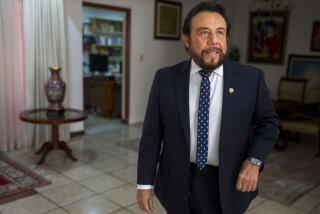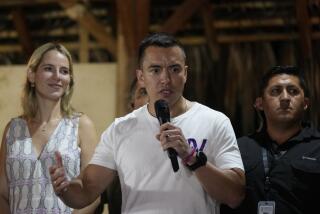Nigeria’s Reluctant Rebel Triggers Rebirth of Pro-Democracy Activism : Africa: More than a year after annulled presidential vote, jailed winner says he’ll no longer avoid confrontation.
- Share via
PARIS — Over breakfast at his sprawling home in Nigeria a few months ago, Moshood K.O. Abiola ruminated on his embattled political strategy.
The multimillionaire had been chosen Nigeria’s president in a free and fair election last year. But when the vote was annulled by the military, Abiola, fearing a blood bath, opted to avoid confrontation. His decision left the democracy movement in tatters.
“I’m a politician,” he explained at the time, pausing to wipe sweat from his brow, “not a guerrilla leader.” But he said he hoped the new military ruler, Gen. Sani Abacha, would have “the wisdom” to relinquish power.
Today, Abiola is in jail, charged with treason. Abacha still clings to power, but barely. And Abiola, in a last-ditch effort to claim his rightful place as head of Nigeria, has started the uprising he once feared.
Millions of workers in Nigeria, Africa’s most populous country and largest oil producer, staged a general strike last week, crippling business and transportation. In addition, workers in the oil industry, which generates $10 billion a year in income, continued their strike, which is now in its third week. The two largest cities, Lagos and Ibadan, have been paralyzed by demonstrations against the government this week, and, according to various reports, the number of protesters killed Monday in clashes with police was between 10 and 20.
The aim of the actions, 13 months after the democratic elections, is to force military strongman Abacha to hand over power to Abiola.
So far, Abacha has kept a low profile, although his government has issued stern warnings that strikes by civil servants and petroleum workers are illegal. The government has agreed to meet with its opponents, but the general’s grand promises of a peaceful return to democracy have vanished.
When Abacha seized power quietly from an army-appointed, token civilian president last November, he raised cautious hopes in some quarters. He gave some of his political opponents important portfolios in the ruling council. He promised to call a nationwide forum for drafting a constitution and then forcibly “retired” 17 generals associated with the previous, notoriously corrupt regime of Gen. Ibrahim Babangida.
But as many feared, Abacha has followed instead the tradition of his military predecessors: He has arrested journalists and dissidents, closed newspapers and dissolved the country’s recently elected National Assembly, as well as all state and local governments.
At the center of Abacha’s problems now is Abiola, a genial 56-year-old chief with a wide following in Nigeria and an impressive international business pedigree.
Alone among the candidates for president in June, 1993, Abiola was able to draw support from a broad spectrum of Nigeria’s 250 ethnic groups.
One reason is that Abiola is from one of the country’s largest, mostly Christian ethnic groups in the south. But he himself is a Muslim, a religion he shares with the northerners who have ruled the country for most of the three decades since it gained its independence.
Another reason is Abiola’s personal wealth, which makes him a respected figure in a country where such achievements are important, and his reputation for honesty, something rare in Nigeria’s corrupt society. As Abiola likes to say, he doesn’t owe anybody anything. And for 20 years he has been courting Nigerians from all ethnic groups, giving thousands of scholarships across the country.
“They claim I am a multibillionaire,” he said a few months ago. “But I don’t smile at my bank statement. I use it to build castles in people’s minds.”
Abiola was born on a dirt floor, his parents’ 23rd child and the first to survive. In fact, his name means: “Let us watch whether this one too will die.”
As a child, Abiola sold wood to help feed his family. But he won a scholarship to school, and his business acumen soon became apparent. From 1972 to 1988, he was a vice president of the American communications giant ITT, in charge of Africa and the Middle East.
Abiola invested the money he earned from ITT wisely. Today, he owns the Concord Press, which includes one of the most popular newspapers in Lagos and is run by one of Abiola’s four wives. He has an oil exploration firm and a 24,000-acre farm, which employs 5,000 people, in northern Nigeria.
He lives with three of his wives and some of their 27 children on Chief Abiola Crescent in Lagos. (His first wife died a few years ago.) Before his arrest, his entourage in Mercedes-Benzes and BMWs, including his personal security detail, was greeted by cheers everywhere it went in Lagos.
Although the former military ruler, Babangida, refused to allow the results of last year’s election to be released, diplomats and other election observers said Abiola was the clear winner. Babangida had done his best to stage-manage the election process, creating two parties, writing their platforms and even approving the candidates. But when 15 million voters went to the polls, he refused to accept their decision.
Abiola was not one of the government opponents who had been jailed off and on for years in their push for democracy in Nigeria. In fact, his appeal was that he maintained contacts with the wide spectrum of Nigerian politicians.
Although pro-democracy forces accepted his victory, they were disappointed when Abiola shied away from forcing a confrontation with the government over the annulled elections. At the time, Abiola said he feared widespread killing.
In fact, pro-democracy riots last July left 168 Nigerians dead. When Abiola heard that the government planned to kill him, he went abroad for several months, making speeches in international capitals to call on Babangida to relinquish power.
Babangida did step down, in August, but he appointed a feeble interim government to run the country. Faced with riots in November over rising gasoline prices, the interim government resigned. The coup was staged by Abacha, who had helped Babangida take power eight years earlier.
By that time, though, many in the pro-democracy movement had given up on Abiola. They thought he should have tried to form his own government and force Abacha to give in but that, in the end, he didn’t have the courage to risk his own life.
“He can’t seem to think of anything to do except wait until he’s invited to become president,” complained Beko Ransome-Kuti, a 53-year-old physician and head of the Campaign for Democracy in Lagos.
Added Gani Fawehinmi, a widely respected civil rights campaigner: “He went to sleep with the mandate. People were prepared to die for him, and he didn’t show enough courage.”
But Abiola said he was just biding his time. He met several times with Abacha, which further upset the democracy activists. And he also launched a campaign, speaking out at churches and business functions, demanding that Abacha recognize his election victory.
Yet the verdict of his friends in the democratic movement weighed heavily on him.
“They think I sold out,” he admitted. “But I haven’t sold out. To kiss somebody you have to get near them. But to bite him, you have to get near him too. And anyway, it would be a foolish man who sits in front of a moving train.”
Recently though, Abiola had a change of heart, concluding that “all Abacha wants is to be president and stay there,” a friend said. So Abiola announced his own government Cabinet, saying, “Let the heavens fall,” and triggered a rebirth of pro-democracy activism across the country of 90 million.
The government responded by arresting dozens, including Ransome-Kuti and, last month, Abiola. Ransome-Kuti later was released.
“The chief just lost confidence in the regime’s ability to negotiate a transition to power honestly, freely and fairly--primarily honestly,” said Randall Echols, Abiola’s executive assistant for U.S. affairs in Washington.
Abiola, Echols said, “was taking a credibility hit by trying to negotiate with the military elite. A lot of people saw it as a sign of weak leadership, and they thought perhaps he was in bed with them.”
So, in the end, Echols said, “he responded to the mandate of the people.”
And Abiola’s fateful decision has, indeed, pushed the government to the wall, raising the specter of spreading civil unrest.
Meanwhile, Nigeria is mired in its deepest depression since the free-spending oil boom of the 1970s. Despite its substantial oil reserves, unemployment stands at 50%, inflation is running 65%, the country owes $30 billion to foreign lenders, and the middle class that once thrived in Nigeria has disappeared, leaving a wide gulf between rich and poor.
The corruption that has characterized so many of Nigeria’s past military dictatorships continues unabated. And the people are fed up with leaders who loot the treasury and make hollow promises of democracy.
“In Nigeria,” Ransome-Kuti said a few months ago, “it is always the man who has eaten who tells the hungry man to be patient.”
More to Read
Sign up for Essential California
The most important California stories and recommendations in your inbox every morning.
You may occasionally receive promotional content from the Los Angeles Times.














